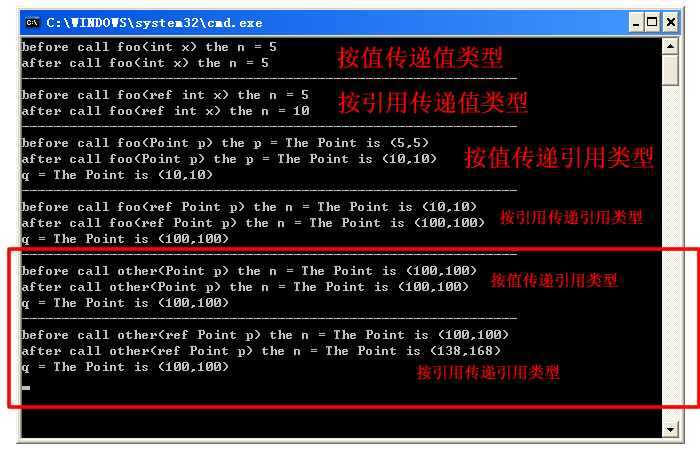原地址:http://www.cnblogs.com/DonLiang/archive/2008/02/16/1070717.html
近段时间,有几个刚刚开始学习C#语言的爱好者问我:C#中的函数,其参数的传递,按值传递和按引用传递有什么区别。针对这一问题,我简单写了个示例程序,用以讲解,希望我没有把他们绕晕。因为,常听别人说起:“你不说我还明白,你一说,我就糊涂了”。
好,现在开始吧。
我们知道,在C#中,类型有值类型(例如int)和引用类型(例如string)之分,传递参数有按值传递和按引用传递之分。这样,简单的组合一下,我们可以得到以下几种传递方式:(1)按值传递值类型。(2)按值传递引用类型。(3)按引用传递值类型。(4)按引用传递引用类型。一般来说,除非使用特定的关键字(ref和out)否则参数是按值传递的。也就是说,会传递一个副本。传递副本的一个好处是,可以避免误操作而影响了原始值。原因是在被调用的函数体内,操作的是副本的值,而不是原始值。当然,传递副本也是有副作用的,最为突出的应该是由于复制而产生的性能损耗,这点在大型的值类型身上尤为突出。那么C#的编译器的默认行为为什么不是使用按引用传递参数呢?呵呵,其实我没仔细深入思考过这个问题。我猜测,是因为安全因素吧,就是怕函数误操作了原始值。这点应该和C#的编译器要求显示使用关键字(ref和out)差不多,都是为了清楚地表达使用的意图,以避免误操作。使用ref等关键字,暗示函数调用者知道,在函数体内,也许存在修改原始值的语句,会改变参数的值(或者叫状态)。
用个简单的示例演示一下。
示例代码如下所示:
 using System;
using System;

 namespace DonLiang
namespace DonLiang


 {
{
 class Sample
class Sample


 {
{

 public static void foo(int x)
public static void foo(int x)


 {
{
 x = 10;
x = 10;
 }
}

 //*
//*
 public static void foo(ref int x)
public static void foo(ref int x)


 {
{
 x = 10;
x = 10;
 }
}
 //*/
//*/


 /**//**//**//*
/**//**//**//*
 public static void foo(out int x)
public static void foo(out int x)
 22 {
22 {
 23 x = 10;
23 x = 10;
 24 }
24 }
 25 //*/
25 //*/



 public class Point
public class Point


 {
{
 private int m_x;
private int m_x;
 private int m_y;
private int m_y;

 public Point()
public Point()


 {
{
 m_x = 0;
m_x = 0;
 m_y = 0;
m_y = 0;
 }
}

 public Point(int x, int y)
public Point(int x, int y)


 {
{
 m_x = x;
m_x = x;
 m_y = y;
m_y = y;
 }
}

 public void Change(int x, int y)
public void Change(int x, int y)


 {
{
 m_x = x;
m_x = x;
 m_y = y;
m_y = y;
 }
}

 public override string ToString()
public override string ToString()


 {
{
 return string.Format("The Point is ({0},{1})", m_x.ToString(), m_y.ToString());
return string.Format("The Point is ({0},{1})", m_x.ToString(), m_y.ToString());
 }
}
 }
}



 public static void foo(Point p)
public static void foo(Point p)


 {
{
 p.Change(10, 10);
p.Change(10, 10);
 }
}

 public static void foo(ref Point p)
public static void foo(ref Point p)


 {
{
 p.Change(100, 100);
p.Change(100, 100);
 }
}

 public static void other(Point p)
public static void other(Point p)


 {
{
 Point tmp = new Point(13, 16);
Point tmp = new Point(13, 16);
 p = tmp;
p = tmp;
 }
}

 public static void other(ref Point p)
public static void other(ref Point p)


 {
{
 Point tmp = new Point(138, 168);
Point tmp = new Point(138, 168);
 p = tmp;
p = tmp;
 }
}



 static void Main(string[] args)
static void Main(string[] args)


 {
{
 int n = 5;
int n = 5;

 //call the foo(int x) method and check what happened.
//call the foo(int x) method and check what happened.
 Console.WriteLine("before call foo(int x) the n = " + n.ToString());
Console.WriteLine("before call foo(int x) the n = " + n.ToString());
 foo(n);
foo(n);
 Console.WriteLine("after call foo(int x) the n = " + n.ToString());
Console.WriteLine("after call foo(int x) the n = " + n.ToString());

 Console.WriteLine("--------------------------------------------------------------");
Console.WriteLine("--------------------------------------------------------------");

 //call the foo(ref int x) method and check what happened.
//call the foo(ref int x) method and check what happened.
 Console.WriteLine("before call foo(ref int x) the n = " + n.ToString());
Console.WriteLine("before call foo(ref int x) the n = " + n.ToString());
 foo(ref n);
foo(ref n);
 //foo(out n);
//foo(out n);
 Console.WriteLine("after call foo(ref int x) the n = " + n.ToString());
Console.WriteLine("after call foo(ref int x) the n = " + n.ToString());
 Console.WriteLine("--------------------------------------------------------------");
Console.WriteLine("--------------------------------------------------------------");
 Point p = new Point(5, 5);
Point p = new Point(5, 5);
 Point q = p;
Point q = p;

 //call the foo(Point p) method and check what happened.
//call the foo(Point p) method and check what happened.
 Console.WriteLine("before call foo(Point p) the p = " + p.ToString());
Console.WriteLine("before call foo(Point p) the p = " + p.ToString());
 foo(p);
foo(p);
 Console.WriteLine("after call foo(Point p) the p = " + p.ToString());
Console.WriteLine("after call foo(Point p) the p = " + p.ToString());
 Console.WriteLine("q = " + q.ToString());
Console.WriteLine("q = " + q.ToString());

 Console.WriteLine("--------------------------------------------------------------");
Console.WriteLine("--------------------------------------------------------------");

 //call the foo(ref Point p) method and check what happened.
//call the foo(ref Point p) method and check what happened.
 Console.WriteLine("before call foo(ref Point p) the n = " + p.ToString());
Console.WriteLine("before call foo(ref Point p) the n = " + p.ToString());
 foo(ref p);
foo(ref p);
 Console.WriteLine("after call foo(ref Point p) the n = " + p.ToString());
Console.WriteLine("after call foo(ref Point p) the n = " + p.ToString());
 Console.WriteLine("q = " + q.ToString());
Console.WriteLine("q = " + q.ToString());

 Console.WriteLine("--------------------------------------------------------------");
Console.WriteLine("--------------------------------------------------------------");

 //call the other(Point p) method and check what happened.
//call the other(Point p) method and check what happened.
 Console.WriteLine("before call other(Point p) the n = " + p.ToString());
Console.WriteLine("before call other(Point p) the n = " + p.ToString());
 other(p);
other(p);
 Console.WriteLine("after call other(Point p) the n = " + p.ToString());
Console.WriteLine("after call other(Point p) the n = " + p.ToString());
 Console.WriteLine("q = " + q.ToString());
Console.WriteLine("q = " + q.ToString());

 Console.WriteLine("--------------------------------------------------------------");
Console.WriteLine("--------------------------------------------------------------");

 //call the other(ref Point p) method and check what happened.
//call the other(ref Point p) method and check what happened.
 Console.WriteLine("before call other(ref Point p) the n = " + p.ToString());
Console.WriteLine("before call other(ref Point p) the n = " + p.ToString());
 other(ref p);
other(ref p);
 Console.WriteLine("after call other(ref Point p) the n = " + p.ToString());
Console.WriteLine("after call other(ref Point p) the n = " + p.ToString());
 Console.WriteLine("q = " + q.ToString());
Console.WriteLine("q = " + q.ToString());

 Console.ReadLine();
Console.ReadLine();
 }
}

 }
}
 }
}
按值传递引用类型 和 按引用传递引用类型
之所以把这两个放在一起讲,是因为,如结果图所示,两种传递方式,都成功修改了值——这两个函数都分别调用了一个辅助修改的函数Change,去修改内部状态,即m_x,m_y的值,从5到10。呃,竟然都可以成功修改原始值,那么,为什么会存在两种方式呢?它们有什么区别吗?分别用在什么地方?为了说明他们的区别,我特意写了两个名为other的函数,在函数内new一个Point对象,并使从参数传递过来的引用这个新生成的Point对象。值得提醒的是,这个引用其定义在函数体外。其运行如上图我用方框框起来那个。
可以很清楚地看到,通过值传递方式,可以改变其值,却不能改变其本身所引用的对象;而按引用传递方式可以。
顺便提一下,代码中,有一段注释掉的代码,使用out关键字的。当你尝试将其两者一起写着,然后,编译,C#编译器是会提示错误的(
error CS0663: 'foo' cannot define overloaded methods that differ only on ref and out)。其原因是,C#编译器,对ref和out生成的IL代码,是相同的;而在CLR层面,是没有ref和out的区别的。C#中,ref和out的区别,主要是,谁负责初始化这个参数使之能用——ref形式是函数外初始化,而out是函数内初始化。